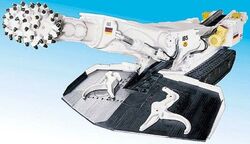Engineering:Roadheader
A roadheader, also called a boom-type roadheader, road header machine, road header or just header machine, is a piece of excavating equipment consisting of a boom-mounted cutting head, a loading device usually involving a conveyor, and a crawler travelling track to move the entire machine forward into the rock face.[1]
The cutting head can be a general purpose rotating drum mounted in line or perpendicular to the boom, or can be special function heads such as jackhammer-like spikes, compression fracture micro-wheel heads like those on larger tunnel boring machines, a slicer head like a gigantic chain saw for dicing up rock, or simple jaw-like buckets of traditional excavators.[2]
History
The first roadheader patent was applied for by Dr. Z. Ajtay in Hungary, in 1949.[1] It was invented as a remote operated miner for exploitation of small seam, close walled deposits, typically in wet conditions.
Types
Cutting Heads:
- Transverse - rotates parallel to the cutter boom axis
- Longitudinal - rotates perpendicular to boom axis
Uses
Roadheaders were initially used in coal mines. The first use in a civil engineering project was the construction of the City Loop (then called the Melbourne Underground Rail Loop) in the 1970s, where the machines enabled around 80% of the excavation to be performed mechanically.[3]
They are now widely used in such as tunneling both for mining and municipal government projects, building wine caves, and building cave homes such as those in Coober Pedy, Australia .
On February 21, 2014, Waller Street, just south of Laurier Avenue collapsed into an 8m-wide and 12m-deep sink-hole where a roadheader was excavating the eastern entrance to Ottawa's LRT O-Train tunnel.[4] A similar incident occurred in June 2016, when a sink-hole opened up in Rideau Street during further construction of the tunnel, and filled with water up to a depth of three metres. The CBC reported that one of Rideau Transit Group’s 135-tonne roadheaders was in a part of the tunnel where the flooding was the deepest. Three roadheaders were used in the construction of the O-Train.[5]
Projects utilizing roadheaders
- Boston's Big Dig[6]
- Ground Zero Cleanup[7]
- Addison Airport Toll Tunnel[8]
- Fourth bore of Caldecott Tunnel[9]
- Malmö City Tunnel
- Confederation Line, Ottawa
References
- ↑ 1.0 1.1 Dr. Helmut Schneider (September 1988). "Criteria for Selecting a Boom-Type Roadheader". Mining Magazine (The Mining Journal, Ltd): p. 183.
- ↑ "Tunnel Virtual Team - Questions and Answers from Ask the Expert". US Department of Transportation Federal Highway Administration. 2006-08-01. http://www.fhwa.dot.gov/bridge/tunnel/qa.htm. Retrieved 2006-09-15.
- ↑ "Melbourne Underground Rail Loop Handbook". Department of Transport. p. 5. Archived from the original on 28 June 2009. http://webarchive.loc.gov/all/20090628211644/http://www.doi.vic.gov.au/doi/doielect.nsf/2a6bd98dee287482ca256915001cff0c/44507f9d12a4406cca25700c0012fe36/$FILE/MURL%20booklet.pdf.
- ↑ "Road collapse leaves 8-metre wide sinkhole at tunnelling site". CBC News. 2014-02-21. https://www.cbc.ca/news/canada/ottawa/road-collapse-leaves-8-metre-wide-sinkhole-at-tunnelling-site-1.2546074. Retrieved 2018-12-04.
- ↑ Chianello, Joanne (2016-06-18). "City to investigate why shutting off water took 2 hours after sinkhole occurred". CBC News. https://www.cbc.ca/news/canada/ottawa/rideau-sinkhole-tunnel-flooding-watermain-1.3640297. Retrieved 2018-12-04.
- ↑ "MTA - Tunnel Jacking". Massachusetts Turnpike Authority. Archived from the original on 2006-09-02. https://web.archive.org/web/20060902113722/http://masspike.com/bigdig/background/tjacking.html. Retrieved 2006-09-15.
- ↑ "Reconstruction : Port Authority on Schedule with Restoration of PATH Service". New York Construction (McGraw_Hill CONSTRUCTION). July 2003. http://newyork.construction.com/features/archive/2003/0307_Cover2.asp. Retrieved 2006-09-15.
- ↑ "American Underground-Construction Association's Featured Project". American Underground Construction Association. September 1998. Archived from the original on 2013-04-14. https://archive.today/20130414062245/http://www.auca.org/month/project0998.html. Retrieved 2006-09-15.
- ↑ "Caldecott fourth bore big dig starts today in Orinda". Contra Costa Times. 2010-08-09. http://www.contracostatimes.com/contra-costa-county/ci_15718144?source=rss&nclick_check=1. Retrieved 2010-08-09.
External links
- An article on underground home design and construction, with a section on use of roadheader machines.
- Ripping head roadheader Video
- [1]
 |



